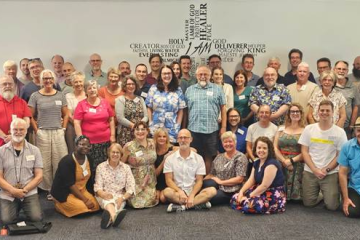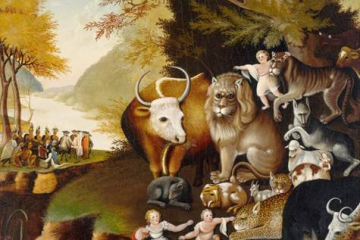Matthew 20:1-16, Psalm 145:1-8
If there is one thing that my husband Aron most dislikes, it is standing in queues. He can tell you many traumatic stories of queues he has had to stand in. So, even before we get to the part in this parable where the landowner pays his workers the same regardless of the work they have done, something that seems outrageous, Aron would have taken a set against it because of the queue. Verse 8: “When evening came, the owner of the vineyard said to his manager, ‘Call the labourers and give them their pay, beginning with the last and then going to the first.’”
I, however, have a different attitude to queues. Sometimes I see them as a challenge. How can I maximise my chances of getting to the front? But I also tend to believe a queue means whatever is at the other end is worth queueing for, so I am happy to queue for it too.
What are the workers in this parable queuing for? This is where we find a range of different interpretations. Literally they are receiving a denarius which the NRSV translates for us as ‘the usual daily wage’, but in the parable, what does ‘the usual daily wage’ represent?
Some interpret it spiritually as God’s gift of eternal life to us. Jesus is speaking about heaven, they say. When we die we will all receive the same reward, regardless of whether we served God all our lives or made a deathbed confession of faith.
Others interpret this parable in more down-to-earth economic terms as promoting a human-centred economy over a wage-centred one. Some even suggest we should preach against the perfidy of a landowner who exploits the workforce and frustrates their attempts to unionise and demand fair wages!
But between the two, the spiritual and the economic, is a reading which for me ties in with how Jewish thinking uses the image of the vineyard, to represent Israel, and how Jesus uses the image of the vineyard to represent the in-breaking reign of God. “The kingdom of heaven is like this…” Jesus says, and takes a familiar scene, of day labourers waiting in the town centre for work and gives it a storytelling spin with this schematic hiring throughout the day; at sunrise, at nine, at midday, at three, and even at 5pm, one hour before knock-off time. And with the landowner’s subsequent outrageous behaviour, paying all his workers the same, Jesus indicates that relationships within God’s kingdom are not determined by positional power, but by the kind of self-giving love and love-filled generosity that Jesus demonstrated for us.
And the writer of Matthew emphasises this by positioning this parable between Jesus declaring wealth to be a barrier to entering the kingdom; and James and John (and their mother) being told that unlike the rulers of the day, “whoever wishes to be great among you must be your servant, and whoever wishes to be first…must be your slave.” And by bracketing the parable either side with the reversal saying, “But many who are first will ne last, and the last will be first.” Or, “So the last will be first, and the first will be last.”.
For Jesus, the parable defends his inclusion of those traditionally considered not worthy (i.e. tax collectors and sinners) as members of the kingdom of God. For the writer of Matthew this passage may also be a way of welcoming Gentile converts into a predominantly Jewish Christianity. For us, as Jesus’ followers today continuing to live into the different values of the kingdom of God, this parable informs us, too, against the dangers of positional power, and reveals how radically God values each one of us.
If you’ve done Safe Church training in this church you might remember an exercise we did on positional power; asking everyone to get into order of when they arrived at Canberra Baptist, those who had been here the longest at the beginning and the most recent arrivals at the end, or in order of age or in order of years of education. These are all very often determiners of positional power and the point of the exercise was to make us more aware of our positional power when we interact with children and vulnerable people.
Now we can’t repeat that positional power exercise this morning, but thinking about the 12-hour work day described in the parable, I want you to consider how long you have been part of the Christian community and to equate it to when, in the parable, you might be said to have ‘started work in the vineyard’. So if you have been part of the faith community virtually all your life, like I have, you might say 6am (or 6:30am just to be safe) or if you joined the church mid-way through your life, 12pm, or just recently, perhaps 5pm. What time did you start work?
This parable has rather severe things to say to those who, like me, started work early. It describes a queue being formed, not with those who were first at the front – that’s the first surprise – but with those who started last. Then everyone is paid the same and the first are outraged. Not because the payment is unfair – that’s not what they say – but because the landowner has made those who came last “equal to us” who came first. In the community of faith, we must guard against letting the length of time we have belonged keep us from allowing others to belong. God values all of us fully as members of the kingdom of God.
Secondly the parable touches on how much we have done, the effort we have put in for God’s kingdom. Perhaps the writer of Matthew is picking up on Peter’s comment to Jesus, chapter 19, verse 27; “Look, we have left everything and followed you. What then will we have?” In the parable the early workers say, “We have borne the burden of the day and the scorching heat!”
I am reminded of an Italian parable that is told about the apostle Peter. Of Jesus asking the disciples to pick up a stone and carry it, and Peter, not wanting to burden himself, picking up just a small pebble, but that evening Jesus turns the stones to bread and Peter has only one small mouthful for dinner. So on another occasion when Jesus asks the disciples to pick up a stone, Peter – not to be caught out – picks up a huge stone and toils all day with it in his pack until, near evening, Jesus leads the disciples up to a cliff where he instructs them to throw their stones into the sea. “What is this about, Jesus!” said Peter angrily. “I carried that stone all day for you – all day in the hot burning sun.” “Did you carry the stone for me, Peter,” Jesus replies, “Or did you carry it for yourself?”
The parable reminds us that we do this work for God, not for reward, for a God who loves and values all of us fully as members of the kingdom of God.
Finally, and this is very challenging for us, the parable reminds us that God fully values all of us irrespective of the ways we human beings measure and value capacity. At 5pm, the parable says, the landowner went back to the marketplace and found people standing there, and there’s a note of gruffness in how he addresses them, “What are you doing here standing around all day.” And the answer is very simple, “No one has hired us.” In a world of market thinking these are those who our society does not value – perhaps it is the old or the young, those with disabilities, those who don’t look so presentable, those with the troubled pasts that Tara’s Angels works with – and yet this parable tells us that all of these are loved and valued fully as members of the kingdom of God.
There’s a wonderful story told by Daniel Montgomery in his book Proof: Finding Freedom Through the Intoxicating Joy of Irresistible Grace about taking his eight-year-old daughter, who had previously been adopted by another family, to Disney World.
For one reason or another, he writes, when our daughter’s previous family vacationed at Disney World, they took their biological children with them, but they left their adopted daughter with a family friend. Usually — at least in the child’s mind — this happened because she did something wrong that precluded her presence on the trip.
And so, by the time we adopted her, she had seen many pictures of Disney World and she had heard about the rides and the characters and the parades. But when it came to passing through the gates of the Magic Kingdom, she had always been the one left on the outside. And so, once I found out about this history, I made plans to take her to Disney World the next time a speaking engagement took me to Florida.
And I thought, he writes, I had mastered the Disney World drill. I knew that people dressed freakishly oversized mouse and duck costumes could sometimes urns children into squirming bundles of emotional instability but what I didn’t expect was the stream of downright devilish behaviour in our newest daughter. In the month leading up to our trip, she stole food, she lied, she whispered insults carefully crafted to hurt her siblings as deeply as possible — and, as the trip grew closer, her behaviour got worse.
A few days before our family we left for Florida, I pulled our daughter into my lap to talk about the latest incident. “I know what you’re going to do,” she stated flatly. “You’re not going to take me to Disney World, are you?” The thought hadn’t actually crossed my mind, but her downward spiral suddenly started to make some sense. I’m embarrassed to admit that, in that moment, I was tempted to turn her fear to my own advantage and say, “You’re right. If you don’t start behaving better, we won’t take you” — but, by God’s grace, I didn’t. Instead, I asked her, “Is this trip something we’re doing as a family?”
She nodded, tears welling up in her eyes.
“Are you part of this family?”
She nodded again.
“Then you’re going with us. Yes, there will be consequences because of what you’ve done, but you are part of our family, and we’re not leaving you behind.”
Montgomery writes, I’d like to say her behaviour got better from that moment, but it didn’t. Her choices spiralled out of control all the way to Lake Buena Vista. Still, we headed to Disney World and it was a typical Disney day; overpriced tickets, overpriced meals, and lots of lines, mingled with just enjoyment to consider going again someday maybe.
But in our hotel room that evening, a very different child emerged. She was exhausted and a little weepy at times, but her month-long façade of rebellion had faded. At bedtime, I prayed with her, gave her a hug, and asked, “So how was your first day at Disney World?”
She closed her eyes and there was a moments silence and then she opened her eyes again. “Daddy,” she said, “I finally got to go to Disney World. But it wasn’t because I was good; it’s because I’m yours.”
It wasn’t because I was good; it’s because I’m yours.
I suspect there’s another reason why we are so concerned as human beings about where we sit in the queue and why we must maintain our positional power, and that is that deep within us there is a lurking fear that God has only so much mercy to pour out, so much grace to give, so much love to go around…but the message of this parable is that however ungrateful, however badly behaved, however underserving God’s pours out mercy and grace and love on all of us. God is a generous God. God loves and values each of us fully as members of the community of God because we are God’s children. We belong to God.
Before we join together in responsive reading and a singing of our next hymn, let’s take a moment to reflect on God’s generous mercy and grace and love for us.


